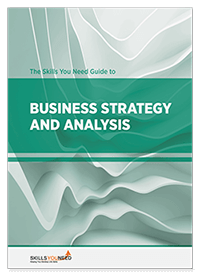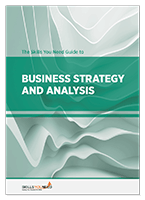The Secret Strategy of the World’s Best Businesses
See also: Creating a Compelling VisionWe all know them. The usual suspects. The first names on anyone’s lips. The brands which are consistently held up as the shining examples of how to “do” business. Do they even need listing? We’re talking Apple, Red Bull, Tesla, Patagonia, Southwest Airlines, Airbnb. The bluest of the blue chips: the brands we all try and copy, but whose level almost nobody can reach.
What exactly is so special about these brands? What is it that they get so right? They aren’t just successful in the conventional sense - there are thousands of businesses like that - no, they have another x-factor. Something that takes them beyond successful, and into iconic.
Well, needless to say, all of their individual conditions are very different, and one could do a unique analysis of each of them. No doubt your conditions are different too - and so those analyses, impressive as they may be, might be of limited value to you. However, there is one trait that they share which is broad enough, and based enough in principle, that it can indeed be learned from by the majority of businesses; even those in very different sectors.
It’s that shared trait which was the subject of my recent TEDx talk, and which I briefly want to outline here.
Refusing to Compete
The thing that binds these seemingly disparate businesses is this: it’s their refusal to compete.
What do I mean by this? After all, these are all business which we might describe as being “great competitors” in their markets, so how is it that we can say they refuse to compete?
Well by “refusing to compete” I mean to say that they refuse to encroach on, attack, beat, or steal business from the other companies in their categories. Whilst most companies operate by trying to gain as much market share as possible, these companies have all identified “walled gardens” within their categories which they have focused on owning, even if that means leaving other brands unchallenged in the rest of their category.
For instance, Southwest Airlines, for the majority of their history, completely refused to serve the business traveller market - thus giving them leverage to do something different and invent the low-cost airlines category. Apple resolutely refused to make their products easily compatible with other hardware and software in the computing space - thus closing them off for years from the super lucrative business market, as well as millions of more practically minded consumers. Tesla chose to make electric cars a luxury and performance category - a complete reversal of the norm which was traditionally based around economy and sacrifice. With these decisions all these brands willing closed themselves off from the bulk of their markets, and millions of dollars they could have quite capably competed for, in order to become something specific, and unchallengeable, in a smaller space.
Normal businesses don’t operate this way. Normal businesses are keen to gain as much market share as possible, and therefore find themselves mirroring their competitors step by step - afraid that if they don’t then they will be gifting part of the category to them.
These iconic brands are different however, they willingly gift the majority of their categories to their competitors. To them, market share is not the ultimate goal - in fact they all have rather poor market share.
Forget Market Share
Isn’t that funny, that the businesses we most celebrate, all have low market share?
Even the iPhone, which feels ubiquitous, only has 14.7% market share - by no means the biggest in its category, and tiny compared to what, say, Nokia used to be. But no, we don’t celebrate them because of their breadth, we celebrate them because of their depth. We celebrate them because they so completely embody a vivid role in their categories, whilst everyone else around them seems so generic, so wishy washy.
Well genericness and wishy washiness are direct consequences of trying to be too competitive, and of trying to fight for too much market share.
So, the question is then - what are you prepared not to fight for? What are you prepared to give up? Which of your competitors are you happy to simply leave alone, to have their part of the market completely unchallenged by you? What is it you want to own, and more importantly never own?
Answering questions like this is the most freeing thing you can ever do as a business, and is the ultimate way to create leverage, since by choosing to underperform in certain areas you will be able to radically over perform in others - to a degree that your thinly spread competitors will never be able to match.
You just need to pick the market role that’s right for you, and then double down on it as aggressively as the likes of Red Bull and Patagonia doubled down on theirs.
If you’d like to know more about how to adopt a non-competitive strategy, then check out my talk on the subject for more perspective:
But in the meantime, put away your weapons. Drop hands, step back, and give your rivals some breathing room. And watch what happens. Because it is only by leaving your competitors alone that your true identity can emerge.
Further Reading from Skills You Need
The Skills You Need Guide to Business Strategy and Analysis
Based on our popular management and analysis content the Skills You Need Guide to Business Strategy and Analysis is a straightforward and practical guide to business analysis.
This eBook is designed to give you the skills to help you understand your business, your market and your competitors.
It will help you understand why business analysis is important for strategy—and then enable you to use analytical tools effectively to position your business.
About the Author
Alex Smith is the founder of Basic Arts and is well known in the strategy industry for his counter-intuitive takes on business future.
Having spent his career advising brands such as The Economist, Innocent, and Hello Fresh on their positioning, he began to see flaws in the normal way we approach strategy, and so developed a new way of doing things by distilling the lessons of the elite few brands who get it right. He now works with some of the best talent from a combination of backgrounds to bring these ideas to every business.


